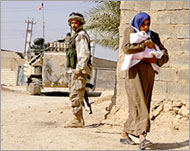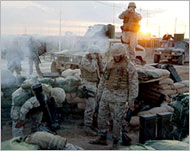US Iraq offensive meets resistance
A major offensive by about 3500 US and Iraqi soldiers near the Syrian border has met resistance, with two American soldiers reportedly wounded.

US-led forces, supported by tanks and fighter jets dropping 500lb bombs, met more resistance than expected from fighters in the town of Husaybah on Saturday, the opening day of the offensive, and only managed to take control of several blocks by nightfall, according to The New York Times, which had a reporter embedded with US forces.
Two US service members were wounded by sporadic enemy fire down alleyways as US-led forces advanced in the town house by house, searching each one, the newspaper reported on Sunday.
“We met more resistance than I expected,” US Captain Conlon Carabine of Indian Company of the Third Battalion, Sixth Marine Regiment, was quoted as saying in the paper.
The forces sometimes found it hard to spot fighters hiding in the town’s 4000 homes and called in support from Abrams tanks and fighter jets, the paper reported.
Families flee
The soldiers discovered that many families had fled Husaybah during the past several weeks, having been tipped off about the offensive ahead of time or having assumed that one was likely in the stronghold.
 |
|
Many families fled the town of |
The US military issued a statement on Saturday saying that US-led forces met limited resistance that day and that no deaths were reported among soldiers, fighters or civilians.
The Operation Steel Curtain offensive in Husaybah is aimed at sealing off a main route for foreign fighters entering Iraq and was seen as a key to controlling the volatile Euphrates river valley of western Iraq and dislodging al-Qaida in Iraq.
The US-led operation, which included about 1000 Iraqi soldiers, will serve as a test of their capability to battle fighters opposed to the US-led invasion of Iraq as well as the Iraqi government.
Explosions
When the offensive began early on Saturday, thunderous explosions shook Husaybah as US marines and Iraqi scouts, recruited from pro-government tribes from the area, fought their way into the western neighbourhoods of the town, 320km northwest of Baghdad, residents said.
 |
|
The US military said three soldiers |
As the fighting continued, US-led forces encountered sporadic resistance, mostly small-arms fire and roadside bombs, the US command statement said.
Iraqi soldiers established temporary lodgings in a vacant area of Husaybah to provide shelter and food for about 400 residents, the military said.
US commanders hope the Husaybah offensive will restore control of western Anbar province ahead of Iraq’s parliamentary election on 15 December and enable Sunni Arabs there to vote.
Civilians endangered
However, some Sunni Arab politicians and tribal leaders said the Husaybah operation was endangering civilians in the overwhelmingly Sunni area and could lead to greater instability throughout Sunni sections of the country.
|
“We call all humanitarians and those who carry peace to the world to intervene to stop the repeated bloodshed in the western parts of Iraq” Sheik Osama JadaanSunni tribal leader |
“We call all humanitarians and those who carry peace to the world to intervene to stop the repeated bloodshed in the western parts of Iraq,” said Shaikh Usama Jadaan, a Sunni tribal leader.
“And we say to the American occupiers to get out and leave Iraq to the Iraqis.”
Husaybah, a poor Sunni Arab town of about 30,000 people, is the first stop in a network of communities that the US military suspects al-Qaida of using to smuggle fighters, weapons and explosives from Syria down the Euphrates valley to Baghdad and other cities.
Many Husaybah residents are believed to have fled the town after weeks of fighting between Iraqi tribes that support the anti-American fighters and those who back the government.
Most Sunni Arabs boycotted the 30 January election of Iraq’s current interim parliament, but many members of the grouping voted in the 15 October referendum that adopted the country’s new constitution.
Many Sunnis also plan to vote in the 15 December ballot, hoping to increase the low number of seats they control in the National Assembly now dominated by Shias and Kurds.
US soldiers killed
The US military said three of its soldiers were killed in other areas of Iraq.
One soldier was killed on Friday by small-arms fire south of Baghdad, and another died the same day when the vehicle in his patrol was hit by a mine near Habaniyah, 80km west of the capital.
The third soldier was killed on Saturday in a traffic accident in southern Iraq.
Those deaths raised to at least 2045 the number of US service members who have died since the beginning of the Iraq war in March 2003, according to an Associated Press count.
According to the UK-based Iraq Body Count, the number of Iraqi civilians killed since March 2003 is more than 26,000.